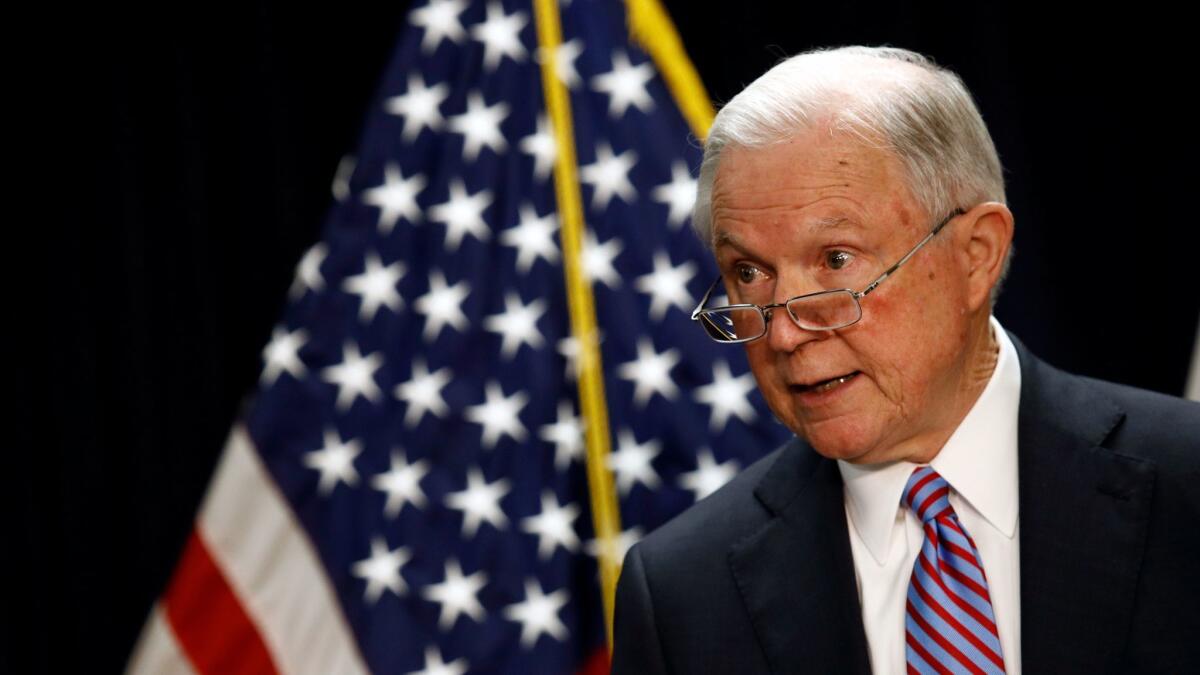Sessions and new Homeland Security chief describe efforts to crack down on gang violence, illegal immigration

Reporting from Baltimore — Atty. Gen. Jeff Sessions and the new chief of Homeland Security on Tuesday linked Monday’s subway bombing in New York City to what they said were misguided immigration rules, calling for stepped up border security and an end to family reunification policies.
Sessions and Kirstjen M. Nielsen, who was sworn in six days ago to head the nation’s immigration enforcement agencies, appeared together in Baltimore to call for stricter visa rules and tighter controls on minors crossing the Southwest border, pressing the Trump administration theme that public safety is under siege because of unchecked migration.
The failed suicide bombing attack by Akayed Ullah, a legal immigrant from Bangladesh, showed the dangers of “chain migration,” said Sessions, who as a U.S. senator from Alabama fought for stricter controls on both legal and illegal immigration. He said Ullah’s uncle won a visa lottery, providing a route to legal status for his sister and then Ullah.
Sessions said chain migration is not a “sustainable, commonsensical policy.” Instead of giving priority to family members, he said, the U.S. should reserve most immigration slots for a merit system that would give preference to skills and the ability to speak English.
“That means welcoming the best and the brightest and turning away the terrorists, gang members and criminals,” Sessions said.
“We should give priority to those who are likely to thrive here — such as those who speak English already and or are highly skilled — not someone chosen at random or who happens to be somebody’s relative,” he added.
Family reunification accounts for two-thirds of the people admitted legally to the U.S. each year. Most are the spouses, children or parents of U.S. citizens.
Sessions said the United States should follow Canada and Australia, which admit more people based on job skills than family ties.
In her first news conference as secretary of Homeland Security, Nielsen also focused on the threat of Mara Salvatrucha, or MS-13. She said the violent gang’s resurgence illustrates the need for tougher policies on unaccompanied minors and families from Central America. Those migrants are again flowing to the border, although the numbers are still far below the surge that provoked widespread concern in 2014.
Nielsen said about a dozen gang members and associates arrested in New York last year first came to the United States as unaccompanied minors. Three had “special immigrant juvenile status,” she said, a program that allows young people who have been victims of abuse or neglect to become legal residents.
“In return for our generosity, these criminals took advantage of our system and became members of one of the world’s most violent street gangs,” said Nielsen, who served as a top deputy for former Secretary of Homeland Security John F. Kelly before he became White House chief of staff. .
Sessions has made MS-13 a special focus since taking office, repeatedly talking about the threat of the gang and linking it to his department’s war on so-called “sanctuary cities” that refuse to cooperate with immigration enforcement agents.
In a speech to police chiefs in Philadelphia in October, Sessions named the gang a priority for a crackdown by the Justice Department’s organized crime task forces. He said federal prosecutors might use tax laws to target the gang, comparing the strategy to the takedown of gangster Al Capone.
President Trump also has repeatedly focused on MS-13, blaming its growth on what he called the “weak illegal immigration policies” of the Obama administration and promising to wipe the gang out.
MS-13 began in Los Angeles and California jails in the 1980s, but established a base in El Salvador after many of its members were arrested and deported in the 1990s. Federal officials say the gang has sent members back to reestablish criminal operations in the U.S.
Sessions and Nielsen each highlighted particularly grisly murders attributed to the gang in Maryland, including a man who was beheaded, had his heart cut out and was buried in a national park on the outskirts of Washington.
“These savage criminals are in our communities, and they are a deadly consequence of our unsecured borders and our failed immigration policies,” Nielsen said.
More to Read
Sign up for Essential California
The most important California stories and recommendations in your inbox every morning.
You may occasionally receive promotional content from the Los Angeles Times.











